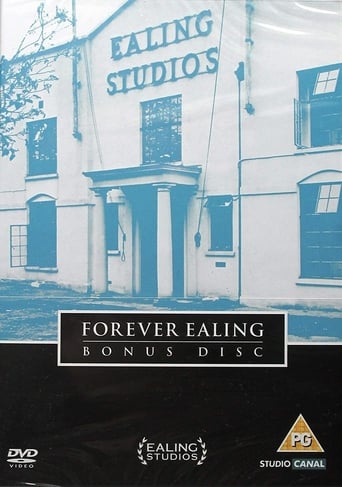Inclubabu
Plot so thin, it passes unnoticed.
Holstra
Boring, long, and too preachy.
Cleveronix
A different way of telling a story
RipDelight
This is a tender, generous movie that likes its characters and presents them as real people, full of flaws and strengths.
MartinHafer
I am a huge fan of Ealing Studios and have seen just about every Ealing film I can possibly find--mostly because they are so consistently good. In particular, their wonderful comedies are gems--and it's because of these that the studio is held in such high esteem by cinephiles. It's because of this that I was thrilled to see this nice documentary on Turner Classic Movies.The film does a good job of describing the origins of the studio as well as its recent rebirth. However, I was left feeling a bit disappointed about the middle portion--mostly because many wonderful films I'd seen weren't even mentioned (such as "Whisky Galore" and "The Titfield Thunderbolt"). Now this is NOT a problem for the casual viewer--a person who has only a cursory familiarity with their films. It does discuss and show some of the important films they made and is a nice introduction. Unfortunately, though, it's just too short. At 50 minutes, it just doesn't give enough information if you are a rabid Ealing fan. Still, it's well made and nice to see some of the old stars being interviewed.
moonspinner55
Andrew Snell directed this fascinating, at times heartrending documentary on Britain's Ealing Film Studios, a once-prestigious movie-production entity which got its start in the early 1900s, later finding its footing in the WWII years with gripping black-and-white combat dramas like 1946's "The Captive Heart" and 1953's "The Cruel Sea". Ealing--the breaking ground for diverse British talents such as John Mills, Michael Redgrave, Alec Guinness, and Peter Sellers--ushered in a new style of dry, witty black comedy in the 1950s, but their later fortunes faltered and it was eventually taken over by the BBC. While Daniel Day-Lewis narrates tenderly, and recent interviews with several of the original players are terrific, there's a forlorn ambiance about the project which is never quite resolved; Ealing got back in the game with one theatrical production, "The Importance of Being Earnest" in 2002, yet Snell ends his film with shots of an empty building covered in dirt and dusty memories. Commentary from Ealing admirers like Martin Scorsese and John Landis are predictably laudatory, however the film clips are highly enjoyable (even if the endings to "Kind Hearts and Coronets" and "The Ladykillers" are recklessly given away!).
blanche-2
"Forever Ealing" is the story of a small studio in England that had people behind it with big dreams. In its heyday, Ealing Studios produced some of the truly great British films, including "Dead of Night," "The Ladykillers," "Lavender Hill Mob," "The Man in the White Suit," "Kind Hearts and Coronets," and many others. This documentary gives us a history of Ealing. A lot of the studio's earlier work before Michael Balcon took over won't mean much to Americans because many of the important celebrities who worked there did not have big careers in American film: Gracie Fields, Googie Withers, John McCallum, George Formby. Other names are more familiar: Alec Guinness, Peter Sellars, Joan Greenwood, Sir John Mills.Particularly fascinating was Ealing's work during the war years, and also the work that went behind the group shot of all of the Alec Guinness roles in "Kind Hearts and Coronets." Probably the most delightful was the accounting by Googie Withers of her co-star, John McCallum, proposing marriage while the wedding of Elizabeth and Phillip was broadcast on the radio, and the subsequent photo used by the newspapers.Narrated by Daniel Day-Lewis (Sir Michael Balcon's grandson), the documentary features perspectives by John Landis, Martin Scorcese, and others. Very good.

